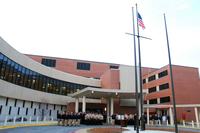It's a film that defined the post-Vietnam "Vietnam Movie."
Though Oliver Stone got a lot of grief for his revisionist approach and tinge of apologism, Platoon was surely a masterpiece of the war film genre and it's raw emotion and action spoke to a generation of servicemembers who fought there and those impacted by the controversial war's outcome. But much of the appeal of Platoon comes from the raw, gritty realism of its scenes -- with actors who were able to touch on the reality of what combat vets felt and saw.
More than two decades after Platoon was released, MGM is releasing a Blu-ray version May 24. To showcase the event, Kit Up! was offered the opportunity to speak with one of the most important contributors to the film, Dale Dye.
A former Marine with several tours in Vietnam as both an infantryman and combat correspondent, Dye later parlayed his ability to speak both Marine and Hollywood into a career consulting with directors of war movies and acting in them as well. Thanks to Dye and his company Warriors Inc., we have the gritty realism of Saving Private Ryan, Band of Brothers and The Pacific.
KU: Where does Platoon fit in America's impression of the Vietnam war?
DD: When we release Platoon in 1986, we were surprised at the extraordinary effect it had on the nation. We hadreally serendipitous timing after a long time I think the nation at that point was ready finally to deal in popular media with the war in Vietnam. It had certainly been on of the most divisive events in modern military history and in United States history. When we released this thing, veterans, who for ten long years kept all of the emotion about their experience in Vietnam penned up inside them -- and in many cases it was just eating like a little ball of acid in there -- people didn't want to just come out and talk about their experience in the war primarily because nobody was interested because it wasn't a popular thing. And so they bottled all this up. And then here comes this little film that really was a slice of life for an average Army infantryman during one of the heaviest combat years of the war. And what happened was veterans just came right out of hiding. Platoon served to melt some of that ice that had formed between veterans and society at large. We were gratified that it happened but that wasn't the intent when we made the film.
KU: What can a film like Platoon tell a veteran of today's conflicts?
DD: I tell you, I spend a lot of time with veterans of our current conflicts and I hear things that are really gratifying. They'll spend time in the day rooms, or around computers or on a screen and they'll watch Platoon, they'll watch Saving Private Ryan, they'll watch Band of Brothers, they'll watch The Pacific and some of the other ones that I've been involved in. And they'll do it for more reasons that just they want to be entertained or because they want to see something that deals with combat because that's what they're involved in. They do it because they see insights in there. They do it because they see insights there, they see connections to their current experience. There are a huge amount of common denominators between what happened in World War I, Korea and Vietnam -- when it comes right down to the combat experience for the guy or gal on the ground...there are huge common denominators. Combat is combat is combat. And the gamut of human emotions that you see in combat everybody sees -- it doesn't make any difference. It is a common experience. And I think they look for and gain insights in some of these films, and certainly so in Platoon.
This is only part of the interview with Dale Dye. Be sure to listen to the entire conversation where Dye talks about how important realism is in his work, the benefit of teaching actors what being in the military is like and his own personal experience in the Marines.








